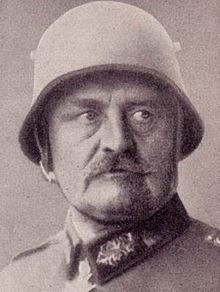Arnold Lequis
Arnold Lequis (born February 2, 1861 in Dillenburg , † February 16, 1949 in Wiesbaden ) was a German infantry general .
Training and military career
Lequis attended high school in Osnabrück and Cologne and the Polytechnic University in Aachen . In 1880 he joined as a cadet in the engineer battalion no. 8 of the Prussian army and was promoted in 1881 to second lieutenant . By 1896 he was promoted to captain in the general staff. In 1898 he was assigned to the General Staff and in 1902 worked as a military teacher at the War Academy .
Activity in the German colonies
1900 Lequis took over as company commander in the East Asian pioneer - Battalion of the expedition China in part. In 1904 he was on the general staff of the Etappen-Kommando in the colony of German South West Africa during the Herero uprising . After temporary work in the General Staff of the Metz Governorate , he resigned from the Prussian Army and was employed on January 11, 1908 in the command of the Schutztruppen in the Reich Colonial Office. In 1909 he was commissioned to represent the commander of the Imperial Protection Force for Cameroon , Major Puder . His task also consisted of finding out about the broken conditions of the officer corps of the Schutztruppe. He undertook an extensive inspection tour in western Cameroon and in the woodlands in the hinterland of the Cribean coast. Promoted to lieutenant colonel in May 1909 , he caused a scandal when he resigned from his command without consultation and refused to serve under the lower-ranking deputy governor, Councilor Hansen. Lequis resigned back into the Prussian Army without the affair having any adverse consequences for him.
First World War and Civil War
In 1910 Lequis became Chief of the General Staff of the Thorn Governorate , promoted to colonel in 1912 and in 1913 commander of the pioneers of the 1st Army Corps . During the First World War he was initially Chief of the General Staff of the Posen Governorate , and from October 1914 then Chief Quartermaster of the 2nd Army . In December 1914 he was promoted to major general. In May 1916 he was appointed commander of the 104th Infantry Brigade and in November of the same year he took over the 12th Infantry Division . In 1917 he was awarded the Order of Pour le Mérite and, after successfully participating in the 12th Isonzo Battle, with the oak leaves for Pour le Mérite. In March 1918 he took part with his division in the German spring offensive and was promoted to lieutenant general in July . Most recently he was governor of Metz and returned to Berlin from there after the armistice was concluded .
During the November Revolution, Lequis received the command of a general command named after him , with which he was supposed to restore order in Berlin in the sense of the OHL before the start of the Reichsräte Congress . The plans drawn up by Lequis and his chief of staff, Major Harbou, for the invasion of the front troops, including many guards regiments, in Berlin were not carried out as planned or failed because most of the soldiers were striving for home. During the invasion of Steglitz , Lequis was sworn in by the Ebert government on behalf of his officers and men in the republic and temporarily acted as military governor of Berlin.
Lequis gained importance in the attempted suppression of the troops of the People's Navy Division in Berlin, which were quartered in the Berlin City Palace and in the Marstall, at Christmas 1918 . Lequis was entrusted with the Guard Cavalry Rifle Division to secure the government district . The sailors of the People's Naval Division intended to make the agreed handover of the castle to the government dependent on the outstanding payment of their wages, which they had previously been denied. Early in the morning on December 24, 1918, the castle and stables were shelled with military equipment by Lequis' troops. However, due to the support of the civilian population who had flooded in, the troops had to withdraw again. After Lequis had given an inadvertent newspaper interview after the crisis had been resolved, he was replaced by General Freiherr von Lüttwitz and transferred to the army officers. On June 23, 1919 he was taken over as leader of Reichswehr Brigade 8 in Upper Silesia in the Provisional Reichswehr and entrusted with the management of the border guard. After the Kapp Putsch , Lequis resigned from military service on September 18, 1920. Three months later he was given the character of General of the Infantry.
literature
- Karl-Friedrich Hildebrand, Christian Zweng: The knights of the order Pour le Mérite of the First World War. Volume 2: HO. Biblio Verlag, Bissendorf 2003, ISBN 3-7648-2516-2 , pp. 328-330.
- Hanns Möller: History of the knights of the order "pour le mérite" in the world war. Volume 1: A-L. Bernard & Graefe Verlag, Berlin 1935, pp. 660–663.
swell
- Estate in the Federal Archives-Military Archives Freiburg N 38.
| personal data | |
|---|---|
| SURNAME | Lequis, Arnold |
| BRIEF DESCRIPTION | German general of the infantry |
| DATE OF BIRTH | February 2, 1861 |
| PLACE OF BIRTH | Dillenburg |
| DATE OF DEATH | February 16, 1949 |
| Place of death | Wiesbaden |

